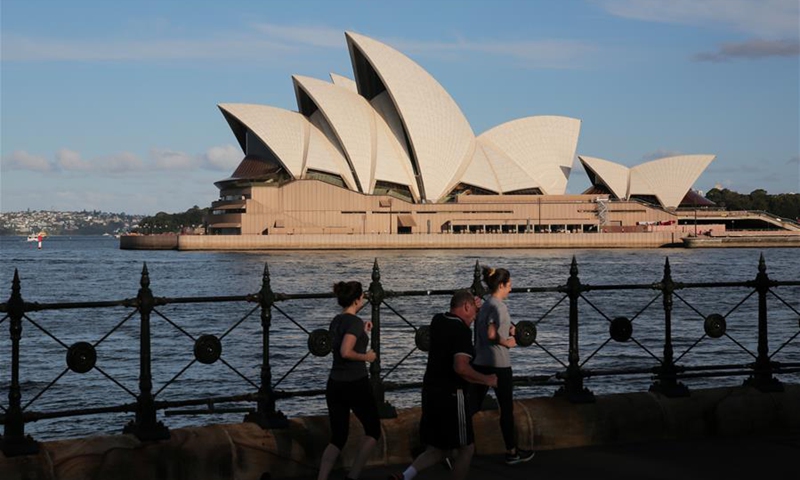Inspection of Australian lobsters meant to ensure public health
By Chu Daye Source: Global Times Published: 2020/11/2 21:23:40
Inspection of Australian lobsters ‘for safety’

People jog near the Sydney Opera House in Sydney, Australia, Nov. 2, 2020. The Sydney Opera House reopened to audiences on Sunday evening, for the first time since March when it was forced to close due to the pandemic, breathing life back into the country's struggling performing arts sector. (Xinhua/Bai Xuefei)
Moves by Chinese customs to enhance inspection of Australian lobsters represent a normal safety precaution to ensure health of Chinese consumers, analysts said on Monday, after media reports suggested that tons of Australian lobsters were stranded at Chinese airports for inspection.
Tons of live Australian lobsters, worth millions of dollars, may spoil if they are not cleared by customs within 48 hours, the Sydney Morning Herald reported on Sunday.
Commenting on the matter on Monday, China's Foreign Ministry said customs' inspection of seafood imports is in accordance with China's laws and aims to ensure safety of the imported food.
"China always adheres to the principle of developing bilateral relationships on the grounds of mutual respect and mutual benefit," Foreign Ministry spokesperson Wang Wenbin said on Monday.
China hopes the Australian side will act in a way that is more conducive to building up mutual trust and cooperation, and in the spirit of the China-Australia Comprehensive Strategic Partnership, bringing the bilateral relationship back to normal as soon as possible, the spokesperson said.
About 95 percent of Australia's A$750 million ($527 million) in lobster exports in 2019 went to China, according to media reports.
Australia is concerned about Australian lobsters becoming the latest victim of the trade skirmish between China and Australia, after a number of Australian exports including beef, barley, wine, cotton and coal ran into various problems in China.
"The Australian side appears to be too sensitive over trade issues amid the fraught ties between the two countries," Ning Tuanhui, a research assistant with the China Institute of International Studies, told the Global Times on Monday.
"There is no need for Australia to politicize trade dispute, and it should treat every single trade issue separately as trade frictions are normal occurrences," Ning said.
Ning said that Chinese customs has generally beefed up inspection measures for seafood amid the COVID-19 pandemic and such safety precautions are absolutely necessary.
A seafood importer surnamed Tang told the Global Times on Monday that Australian lobsters account for 70-80 percent of the Chinese high-end market, serving as an essential item at Chinese wedding parties and being supplied to hotels.
Having had some shipments face delays at airports waiting for checks for heavy metals such as mercury, Tang said his company has chosen to hold off placing new orders until the situation clears a bit.
"We don't expect the impact to be short-term, and we will plan for the long term."
Tang said his company may have to buy lobsters from New Zealand as a substitute if the situation remains unresolved, even though Australian lobster prices have gone up by 40 percent due to New Zealand's tiny output and continued solid demand from China.
Newspaper headline: Inspection of Australian lobsters ‘for safety’
Posted in: INDUSTRIES